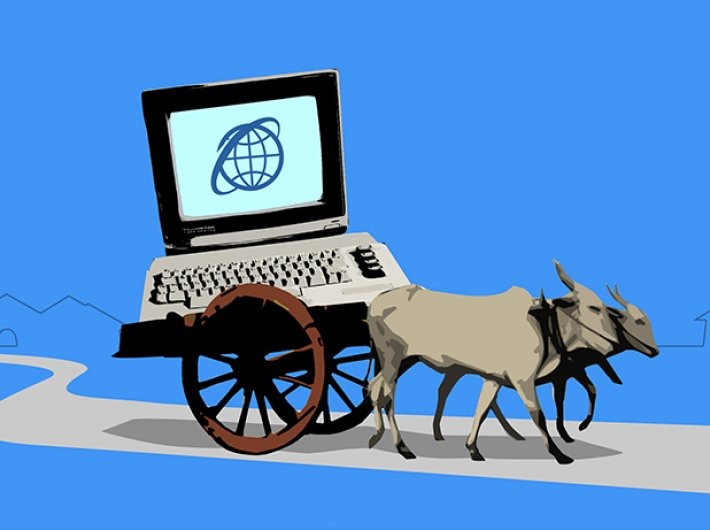ISLAMABAD: The government has initiated a process to establish two more smart villages in Punjab and Sindh provinces following the success of the pilot project in Islamabad over the past four months.
“One smart village will be established in southern Punjab while another in Sindh to improve the standard of living of the rural population by addressing various challenges they face,” a Universal Service Fund (USF) spokesperson told WealthPK.
The specific locations for these smart villages will be determined soon, as stated by the USF spokesperson.
The government has already decided to establish smart villages across Pakistan, including in Azad Jammu and Kashmir (AJK) and Gilgit-Baltistan. These areas have been experiencing a lack of work opportunities, inadequate healthcare and education facilities, as well as limited revenue generation. Furthermore, they face issues such as gender inequality, illiteracy, and a rural-urban divide exacerbated by unequal access to technology.
The implementation of digital villages is expected to alleviate similar challenges faced by people across all provinces, including AJK and Gilgit-Baltistan. The Ministry of Information Technology (MoIT) has established the USF to ensure that the benefits of the telecom transformation reach every part of Pakistan.
A trial project was launched earlier this year in the village of Gokina, located in the Margalla Hills, approximately 21 kilometres from Islamabad. This initiative utilises the internet to connect remote communities and provide them with digital services. The success of Gokina project has prompted the government to replicate it in other parts of the country.
The Smart Villages of Pakistan project was initiated in 2021 by the MoIT in collaboration with the International Telecommunication Union (ITU), USF, and Huawei. It drew inspiration from the “Smart Islands” initiative, which focuses on providing connectivity and sustainable services to neglected island communities. Pakistan holds the distinction of having established the first smart village in the Asia-Pacific region, as stated by Federal Minister for IT and Telecommunication Syed Aminul Haque.
In Gokina, a needs assessment survey revealed three key areas of focus: education, healthcare, and the development of digital skills and entrepreneurship. The survey identified a shortage of science teachers in the village’s secondary school, which negatively impacted academic performance and future prospects for students. To address this issue, the Gokina initiative developed e-education through a social enterprise called TeleTaleem.
“TeleTaleem offers science subjects, including physics, biology, and chemistry, to approximately 100 students in grades 9 and 10 at Gokina to fulfil the need for qualified teachers,” Assistant Manager of Programmes Aliya Naseeb told WealthPK. Highly skilled educators from Islamabad connect with the girls’ school daily for a 40-minute online class in science subjects.
“The school is equipped with internet connectivity, a large LCD TV, a webcam, speakers, microphones, and an inverter to ensure uninterrupted power supply, fostering an interactive learning environment,” she said.
TeleTaleem serves all education segments across the country, from primary to tertiary levels and from teacher education to technical training, according to Aliya Naseeb.
Similarly, the Gokina initiative has also established a telemedicine provider called Sehat Kahani to enhance medical facilities for the community. Previously, residents had to travel over 20 kilometres to access medical services in Islamabad, as the village’s medical centre provided only a limited range of healthcare options. Through Sehat Kahani’s digital healthcare platform, a network of highly qualified online physicians now connects with patients to offer online voice and video counselling as well as diagnostics.
Given the scarcity of hospitals in Pakistan, local healthcare centres often struggle to meet the needs of critically ill patients. Video consultations have been found to address the concerns of 70% of patients who seek medical attention at city hospitals or clinics. Only 30% of patients require specialised care in hospitals.
In addition to education and healthcare, there was a need for digital skills development and enterprise support for local businesses in Gokina. This included areas such as handicrafts, fashion design, stitching, modern farming methods, cookery, marketing, and financial accessibility.
Digital technology and innovation are seen as crucial to empowering women who face mobility issues and find it challenging to work outside their homes. By providing access to commercial opportunities from their residences, digital technology acts as a bridge to empower them.
Overall, the establishment of smart villages in Punjab, Sindh, and other regions of Pakistan aims to improve the standard of living for rural populations by addressing key challenges through digital connectivity and innovative solutions in education, healthcare, and enterprise development. –INP






